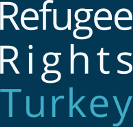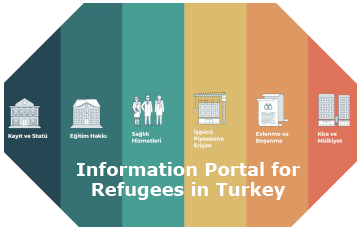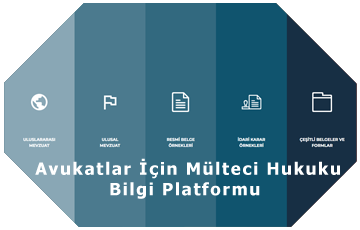Beneficiary Stories
Beneficiary Stories, curated by Refugee Rights Turkey, illustrate the impactful services we provide to beneficiaries, lawyers, and civil society professionals in the field. These narratives explore the journeys of our beneficiaries to Turkiye, their engagement with mechanisms within the country, and the comprehensive assistance offered by Refugee Rights Turkey. Moreover, the stories highlight the involvement of lawyers and civil society professionals in the migration field, emphasizing the support offered by Refugee Rights Turkey to enable and enhance their involvement.
Each story is meticulously selected from our organization's beneficiaries, with adjustments made to sensitive personal details to uphold the narrative's integrity.
Songs of Freedom: A Tale of Courage and Resistance
In a country dominated by silence, Armin* strongly used his most powerful weapon: music. As a result, he was forced to leave his country but did not know how to apply for asylum in Türkiye until he met Danish Refugee Council’s partner, Refugee Rights Türkiye.
“Music, especially rap, is my life, my world, my youth, my family- my everything. My dream is to live and breathe rap. In many ways, it feels like my god, a presence I draw my strength from.”
This is how Armin* talked about his passion for music. He used to create underground rap music in Iran, a form of music that is prohibited in Iran due to religious and political restrictions. When he was a student, he participated in human rights protests and supported his cause through his music. As a result, he was detained, and his songs were saved in his detention files.
This incident did not stop him but made him more determined to pursue his political activities and give voice to the oppressed through his music. After he was released, Armin continued his activities through recording an album with human rights songs. His family and friends were concerned about his safety and tried to convince him to stop protesting. Torn between his desire to express himself freely and the potential risks of imprisonment, he decided to flee his country to Türkiye.
After he arrived in Türkiye, Armin went to Isparta and applied for a residence permit there. Afterwards, he opened his own business, hoping that it would also give him a chance to write his music freely, but everything failed. He faced financial difficulties, while his music on social media was not getting recognized. He decided to go to Europe but was apprehended and taken to a removal center.
Facing the danger of being sent back to his home country, Armin found hope through another detainee who introduced him to Refugees’ Rights in Türkiye (RRT).
Armin, reached out to the Administrative Detention Hotline (+90 507 218 62 85) for people under administrative detention within the scope of the project carried out by our institution, Refugee Rights Türkiye (RRT), in partnership with the Danish Refugee Council (DRC). Funded by the European Union (EU), the project offers legal counselling to asylum seekers and vulnerable migrants, supporting them to appeal administrative detention and deportation decisions and access protection mechanisms. RRT accompanied Armin to Istanbul and helped him to overturn the deportation decision. Armin was worried, but RRT team succeeded in overturning the decision and helped him apply for asylum registration. Armin was finally safe.
"I have received an incredible support from RRT. The lawyers are not only highly skilled but also deeply professional. They handled my case with great care and dedication, putting in a tremendous amount of effort. I truly appreciated their hard work, the consistent follow-ups, and the way they stood firmly behind their work."
As part of asylum obligations, he moved to Erzurum. Although he was safe, he was worried he would not be able to make music freely, but there was a surprise waiting for him.
Many of his followers on social media started supporting him when he was in detention. Some of them offered him a studio and help in organizing concerts in several Turkish cities. His dream finally came true.
“I want to be a beacon of hope for my followers, a voice for the thoughts and emotions they cannot express. I want to echo their inner world while continuing my path.”
Although Armin is safe now, there are countless others who still struggling to live freely and safely. DRC and RRT continue to ensure that all refugees have access to legal protection and support they neeed.
*The name and some personal information of the beneficiary have been changed to protect their identity and not to disrupt the plot.

Advocating Refugees' Rights
Mustafa Durukan, an attorney affiliated with the Ankara Bar Association, is one of many lawyers in Türkiye who are dedicated to providing legal support for asylum seekers. Durukan graduated from Marmara University’s Faculty of Law in 2018 and worked with experts in the labor law field at the start of his career. Later, he shifted to administrative and criminal law in which he is currently working. From the beginning, he showed interest in migrants and asylum seekers' legal status in Türkiye. He realized the importance of identifying potential errors in administrative detention and deportation procedures that may result in irreparable harm. Durukan stresses the need for heightened attention and in-depth examination, particularly for cases relating to restrictions on individual liberties.
After being introduced to Refugee Rights Turkey (RRT) by a lawyer friend, who recommended Refugee Rights Turkey’s online seminar program, he attended the capacity-building sessions titled "Deportation Procedures and Appeal Procedures" and "Administrative Detention, Alternative Obligations and Appeal Procedures". After the seminar, Durukan, who is already working with foreign clients, reached out to Refugee Rights Turkey’s Helpdesk (+90 850 218 48 30) available to support legal practitioners, as well as asylum seekers and refugees to receive legal advice on a workplace dispute between a client and his employer. Refugee Rights Turkey legal staff received information specific to the case, and informed Durukan of the relevant parts of legislation concerning deportation orders for those working without a work permit, and the administrative fines. “The legal advice provided by the Refugee Rights Turkey team was precise and contributed to my case,” says Durukan.
Durukan had previously participated in the Ankara Bar Association's "Foreign Law Specialisation Seminar", and he benefitted from this seminar focusing on the theoretical framework as a lawyer being newly introduced to the field. He mentioned that RRT's seminars complemented earlier training by presenting practical discussions through sample cases and providing a comprehensive understanding of the application of the law.
“Even if you know your rights, it is not easy to understand the laws of a foreign country,” he says. “In the near future, we will continue to see the influx of refugees due to the wars in Afghanistan and the Middle East. Therefore, I believe that the need for lawyers in this field will increase accordingly. I want to continue to support vulnerable groups of people who sought asylum in our country so that they can access their protection and fundamental rights.”
Durukan highlights the difficulties of visiting removal centres due to the logistical challenges and limited communication options. Still, he succeeded in helping a client whose file went missing at Ankara Akyurt Removal Centre. The situation created complications in resolving the issue with authorities. He submitted a request to look for the file. Later, he realized that there was also a Voluntary Return form in the file and that there was a mistake in his client’s statement. With the support of other lawyers, he documented a statement from his client explicitly refusing "voluntary return," and then appended this record to the client’s file. After this intervention, he was able to ensure that the deportation decision was appealed and resolved positively by the Court’s decision. Accordingly, the deportation of the person was prevented.
To support professionals working in the field of migration, RRT, in cooperation with bar associations in various provinces, conducts training and seminars to support the specialization and activities of lawyers in the field of asylum law; and provides expertise support services. This allows asylum seekers and foreigners under administrative detention to benefit from the Legal Aid system.
The seminars are conducted in coordination with the Danish Refugees Council (DRC) and funded by the European Union.
For more information on these activities, please visit website
You can follow our online seminars on our Twitter and LinkedIn accounts
You can reach our hotline at +90 850 218 48 30
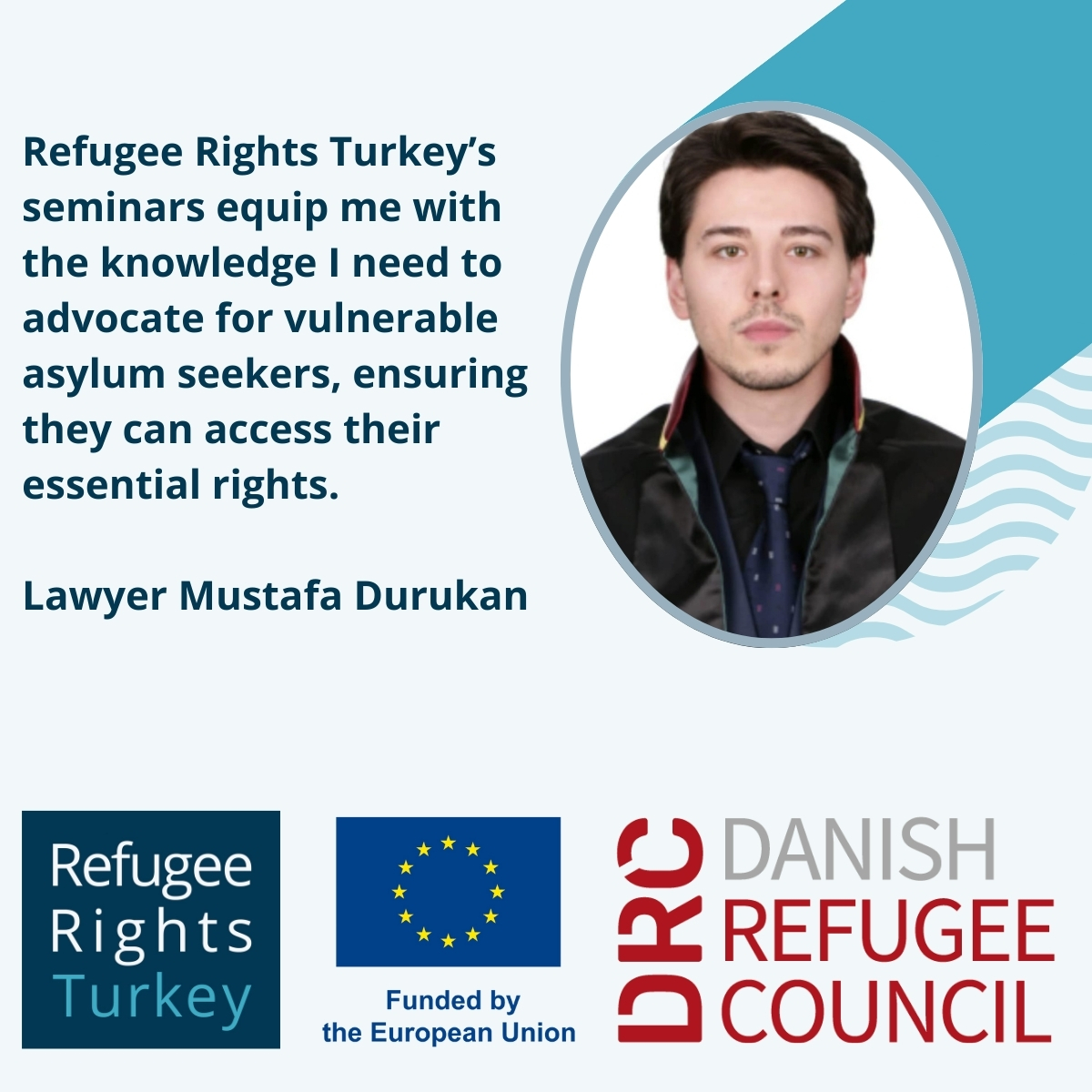
Looking for a Safe Haven
The Taliban takeover of the government in Afghanistan has affected the lives of many people. Some of those still experience the consequences of the abrupt takeover, including those seeking asylum in Türkiye.
Twenty-five-year-old Afra*, a young mother of two children, was silent when she was asked about her life in Afghanistan and the reasons for leaving her country. The painful memories and the fear of the future made her drift into her own thoughts.
Afra wanted to marry the person she loved, Isaad, but her family opposed the marriage, especially her older brother, who was a member of an armed group. Afra insisted and married the person she loved. At that point, her life started falling apart since her brother constantly threatened her. It was no longer safe for her and her husband to stay in Afghanistan. They made the difficult decision of leaving, heading first to Iran.
Afra’s husband found a decent job there, but she was not able to feel safe. Afra and her husband had to leave Iran and go to Türkiye with their newborn daughter, Mahnaz. Their journey was exhausting, yet there was more trouble to come.
Afra and her family entered Türkiye and eventually reached Istanbul, where they applied for International Protection, a temporary status granted to asylum seekers deemed to meet the Turkish Government’s criteria. The accommodation conditions were rough as they faced challenges in getting furniture. They were struggling to provide the baby with basic needs. Her husband was trying to make a living by working daily jobs whenever he could find any, and she had to stay with the baby at home with no support network. Following their struggle with the economic conditions in İstanbul, Afra’s family applied for asylum at the migration authorities in Yozgat, yet she was still unsettled and afraid of the possibility of her brother somehow finding her in Türkiye. As a result, she and her husband decided to try and cross to Europe through Greece with their two children Mahnaz and Esmat. They traveled with 150 people on a tiny boat but could not reach their destination. Afra contacted the Turkish coast guards to seek help near Muğla. A moment of feeling safe did not last long, as their international protection application in Türkiye was withdrawn following this attempt.
While they were applying again for the asylum status, they decided to sell their properties in their home country, so they could rent a place in Yozgat to show authorities their intention to reside regularly in Türkiye. Afra was able to receive her money through a middleman, but she got mugged on her way back. Not knowing what else to do, she approached a police station, and she was detained with her two-year-old child due to her irregular status. They were immediately sent to Selimpaşa Removal Center.
“All I wanted was a safe place for me and my family,” she said. “Why am I here?”
Isaad reached out to Refugee Rights Turkey (RRT) asking for legal counselling and assistance for his wife and son. In coordination with the Danish Refugee Council (DRC), RRT was able to reach Afra and her son through their legal support services funded by the European Union Humanitarian Aid while she was still under administrative detention.
When the RRT staff lawyer visited Afra at the detention facility, he provided her with legal counselling regarding asylum procedures and her rights under detention in Türkiye after checking the deportation order in her file. Later, the RRT lawyer supported Afra with a petition submitted to the detention authorities explaining that she and her family would face persecution by her brother and his armed group if she and her family were sent back to Afghanistan. The mother and her two-year-old were released following the intervention. Following their release, RRT staff provided Afra’s family with detailed information regarding the procedures to follow to obtain a legal status.
Afra is following RRT’s instructions to be a legal resident of Türkiye. Meanwhile, she works at cleaning jobs to afford her children’s basic needs. She has dreams of getting a regular job and sending her children to preschool once she obtains identification documents. Those dreams are her reason to bear all the hardships she faced and move forward. For now though, she is safe.
*Person of concern’s name has been changed to protect her identity
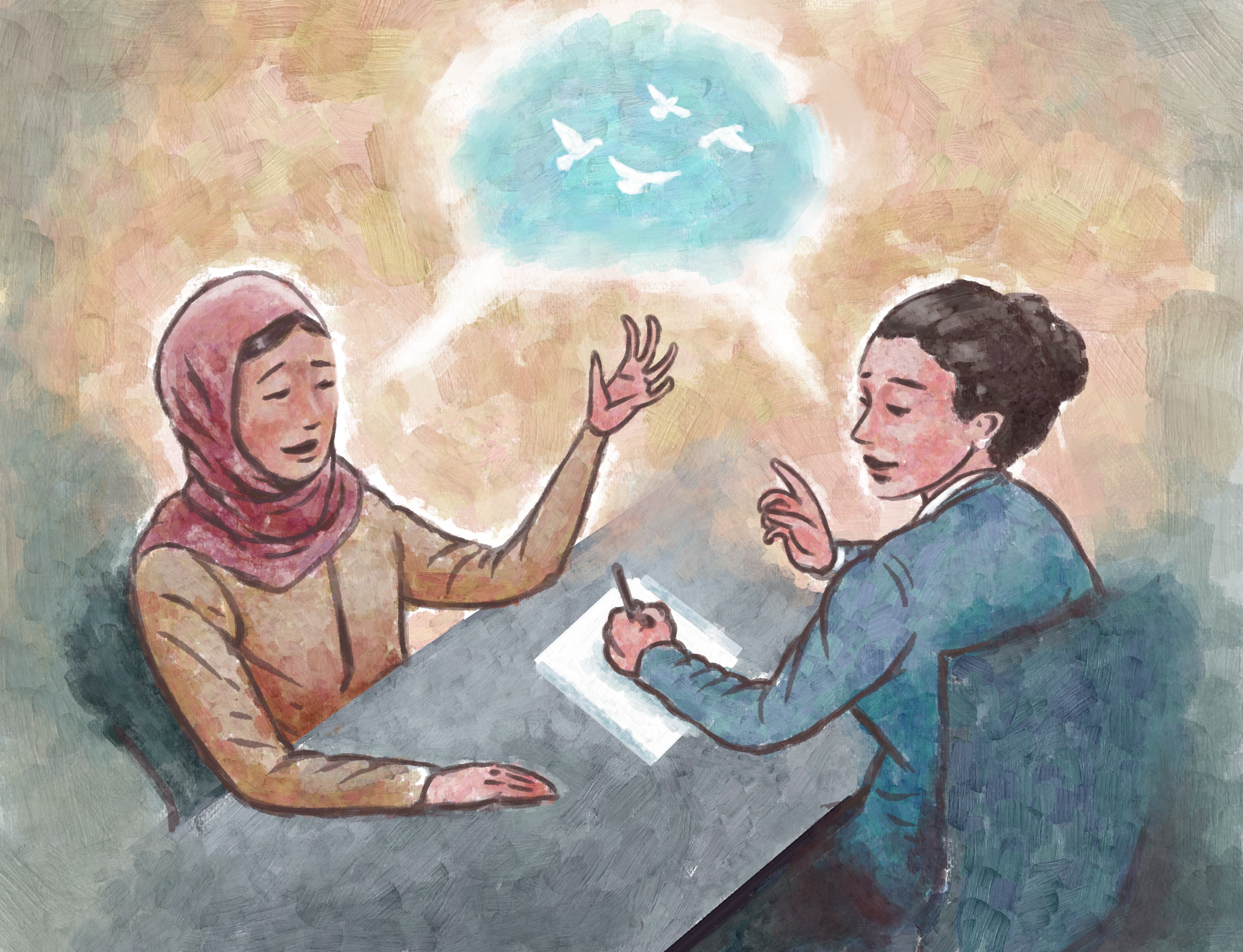
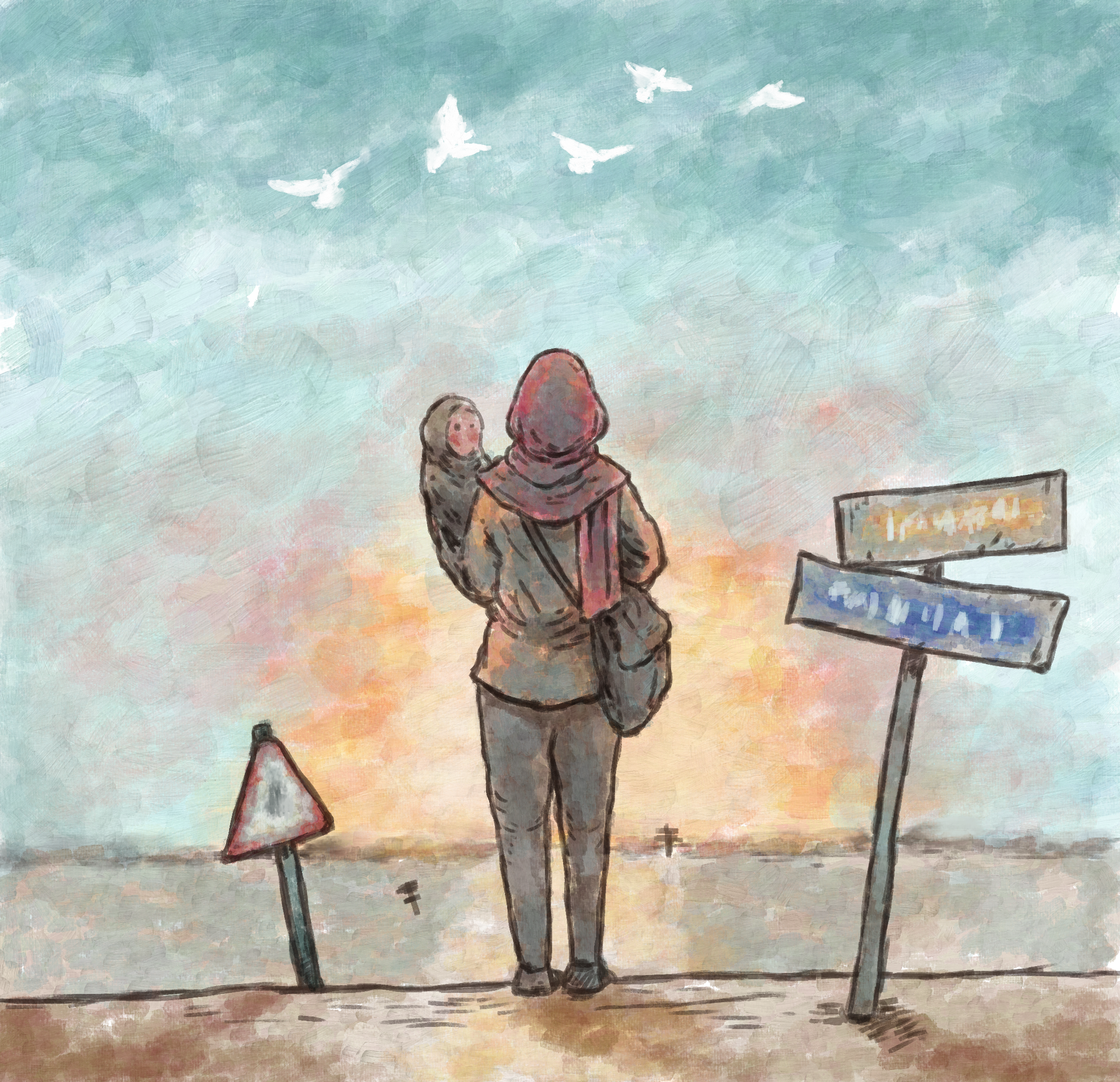
The Long Journey to Safety
The crisis in Afghanistan has pushed millions to leave their country, but many are not familiar with the procedures to apply for refugee status, putting them at risk of deportation.
Twenty-seven-year-old Hamid* had difficulty answering the question “Why did you leave your country?”
He was hesitant for a minute. Many painful memories rushed into his head. He remembered the horrible moments that made him take that decision.
Hamid worked as an office assistant at an international organization in Kabul, Afghanistan, to support his family. In 2015, he was on his way to work when a group of armed men stopped him at a checkpoint and asked to see his documents. They found out about his identity and his work, and decided he was acting against their interests. They detained and tortured him for 12 days. Later, he was released, but it was clear that staying in the country was no longer safe for him. When his manager heard about the incident, he advised him to flee to another country and offered him some money.
It was a long journey. Hamid first went to Iran and stayed there for several months, then decided to leave for Türkiye because Iran did not grant him asylum status and he was at risk of being sent back to Afghanistan. In 2016, he arrived in Istanbul, Turkey, where he worked in different jobs such as shoemaking and knitting while trying to obtain a legal status. The attempts lasted for two years but they were all in vain. He stayed in Istanbul without any legal documents until 2021 when he was stopped by the police on his way to a hospital. Once they realized he was residing without any legal documents, the police detained Hamid for 35 days. “I prefer being detained,” he says. “I cannot go back and risk my life.”
After the detention process, the court was about to decide on Hamid's deportation when one of his relatives contacted our organisation "Refugee Rights Turkey" (RRT). As part of the European Union (EU) funded project in partnership with the Danish Refugee Council (DRC), we have a counselling hotline for people in administrative detention or released from detention (you can reach this hotline on +90 507 218 62 85). Through this hotline, we provide legal counselling on detention rights. As part of these services, we also provided Hamid with legal counselling on his rights as an asylum seeker. "One of the difficulties that asylum seekers face is the lack of information about their rights," says our lawyer friend who supports Hamid. "They don't realise how to deal with the situation, which can put them at risk."
The lawyer later interviewed Hamid to record his reasons for leaving Afghanistan. Due to the fact that he was in danger if he were to return there, he was identified as an eligible person for obtaining refugee status. RRT filed an appeal against the deportation decision. The appeal was rejected in the first instance, then was finally accepted in August 2021, and RRT supported Hamid in his refugee status application “I cannot describe my feelings,” he says. “I lived under threat for years because I could not know how to obtain the document that protects me from being deported.”
We also referred Hamid to another NGO and provided him with support to receive treatment as a victim of torture. Hamid's mental health is improving, but most importantly, he now feels safe and can walk freely without fear. He hopes to settle in a third country where he can continue his education and become a mechanical engineer and business owner.
Turkey hosts the largest number of refugees in the world. Lack of information and legal representation puts many refugees at risk of being returned to the countries they fled. DRC and RRT's main goal is to work to ensure that all refugees have access to the information they need to access legal protection and their rights under the law. they fled. DRC and RRT’s efforts continue to ensure that all refugees have access to legal protection and the information they need to access their rights under the law.
*Beneficiary’s name has been changed to protect his identity.


